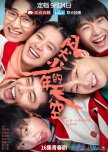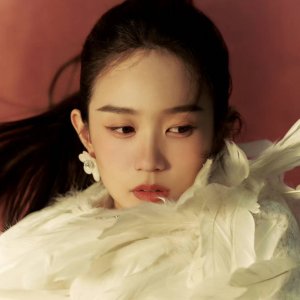
My new blueprint for the childhood friends to lovers trope.
I… don't ever watch high school dramas. I find it hard to find the appeal in a time that's been so long ago for me now & triggers some unpleasant memories. So it's a wonder to me too that I watched this drama – and stuck with it til the end, completely engrossed and invested. Why?First off, I have to thank the cinematography and editing department for that. Summer Again is shot and coloured in such a way that elicits very specific sensual responses of well, summer: the fresh sea breeze playing with your hair, the lush greens and the smell of fresh flowers in the park next to your house, the way you have to squint your eyes right after waking up because the summer sun is so bright in the early mornings, the magic sensation of staying up late on mild summer nights, and the constant buzz of life compared to dreary winters or rainy autumns. Summer Again, short, is a visual feast that transports you right to life in a small, seaside holiday town.
In this setting we meet our heroes Tong Xi, a ballerina from the big city, and Lin Nan Yi, her childhood sweetheart & secret manga artist. Surround the two leads with two faithful and cute friends (a pair of childhood friends as well), a rivalling girl & some seniors to look up to and you have the story. Sounds clichéd? Yeah. But sometimes all I want for a drama is to execute the tropes and clichés it commits to well. And unexpectedly, Summer Again excels in that. If I had to describe the way the story was told, I would describe it as "fresh", "unpretentious" and most of all, "sincere".
There is a beautiful sincerity in the way this drama captures the peak of high school life, our sweet 17s, its ups and downs and that pure & innocent heart most of us were carrying then: from the drama that the characters defined as problems to the way they tried to solve them and gave each other advice, it's all really realistically told from the (limited) worldview of teenagers. It's this realism that balanced the drama throughout. There was drama, but there was never hysteria as dramaland is wont to do. Watching Summer Again is an easy-breezy feat that sends you right back down memory lane to simpler days.
Doesn't mean that the drama is not meaningful: our characters are confronted throughout with navigating that period of life when we first started to think about who we are, what we want, what we expect from ourselves and what others expect from us & how we can be our most authentic self. The conflict between "just wanting to be a simple teenager" and all the pressure that our circumstances put on ourself is maybe best shown in Ni Xiao Wan, the "antagonist". I can't even dislike her; the show gives us too good of an explanation of why she behaves the way she does. It doesn't excuse her mistakes but it humanises her.
Our leads on the other hand, are my new blueprint for a childhood friends to lover story. While Tong Xi's growth can be observed like a beautiful arc spanning the show (look out for how she solves problems), Lin Nan Yi is maybe an almost too perfect classic male lead; I guess his only weakness is that he doesn't like to rely on others for help much and can be too secretive. But the way he handles issues is so relatable and impressive that I forget how little flaws they gave him to begin with. Though they are teenagers, Tong Xi & Lin Nan Yi resolve issues better than most adult drama pairings I've seen.
They are open, honest & forthright with each other. Encourage and support each other. They communicate, a lot. They are not afraid of countering the other, but always give them enough room to come to their own conclusions. Ni Kexin & Chen Heyi are rookie actors but absolutely sell their roles to me. It's to this drama's benefit that they are rather unknown; they play their roles so relaxedly that I have a hard time differentiating between what's acted & what's their real persona. And OMG Chen Heyi's eyes: any ice block would melt at how his Lin Nan Yi looks at Tong Xi. Their story never felt forced and was beautifully and organically told from their rekindling, their clashing and their getting closer. It makes absolute sense for them to be attracted to each other.
I'm starting to ramble and I didn't even get into the second leads yet. But to cut it short: their group of friends is adorable, the actors have great rapport together & I just want all four cast in another project again. Last up, OST-wise this drama is a gem. So yes, please do check it out. Let me tell you, by the end of it, just like downing a glass of fresh, cold (mint) water in a hot summer, you'll want to rewatch it again!
Esta resenha foi útil para você?

That bittersweet, nostalgic sting of growing pain.
I'll be upfront: I am usually not one for high school dramas. I find it hard to relate to a period that for me personally is tied to anguish and long nights awake, and had little to do with the bright camera filters that are wont to overlay the frames of youth dramas. That said, in its mostly well-paced sixteen episodes, Run For Young (RFY) has, however, successfully kept me chasing after hills upon hills of emotions, sprinting through the highs and lows of early adulthood.For some, RFY might thus be too theatrical in its first episodes (1-4) and / or too dramatic in its later episodes (13-16). Well, it is indeed both theatrical and dramatic. The crazy antics of the four childhood friends at the core of the story may come off as overacting at first (maybe rightfully is, in some instances) but at closer look clearly reveal a stylistic choice. And what a choice at that! If there's anything in our lives that we tend to aggrandise and dramatise in our recounts, aren't those the escapades of our youth?
That's not to say that all narrative strings pass my scrutiny. For example, I'm skeptical of how Li Anran and Ma Tian's strict and 'bourgeois' parents could ever approve a move to another high school in their last year (for no 'good reason'). Or of how their school seems incredibly relaxed about the kids' shenanigans. Or of the harebrained, 'gouxue' plot that set up the last (weakest) third of RFY, and for that reason never seemed properly cleared up either. And it is certainly debatable how much pain – in this show particularly endured by two of the lead characters – is needed in a youth drama (it verges close to gratuitous at times).
But overall, I find – and got to appreciate – that RFY takes on a sober(-ing) approach to portraying this specific period of life. Embedded in wider societal issues of class disparities & systemic poverty (5/7 of the main characters originate from 'poorer' backgrounds) and subsequent issues of prejudice or naiveté and feelings of shame and helplessness, as well as traditional gender expectations, the show traces – with a good portion of both humour and tragedy – the way early adulthood manifests itself so differently given one's circumstances. For some, it's easier to retain bits of a childlike innocence (Zhu Weijiao, Ding Rongliang), while others were pushed to grow up quickly (Tu Jun), or simply had no choice BUT be grown-up (Liu Wenqin).
(The social commentary that emerges out of such a setting, however, remains relatively light, if not even loses its soft bite towards the last episodes – when it had most potential to be revived. Simply said, it serves as a functional frame to these youths' lives as RFY, genre-affirming, still takes place in a high school setting and mostly occupies itself with high school related events.)
In a hotpot of marathons to train for, music competitions to participate, a gaokao to exasperate about, and the part-and-parcel love life woes of high school students, I am particularly fond of how characters and friendships were developed in RFY. Though not everyone got equally much focus, at least one storyline was dedicated to each of them – and revealed twists and layers to their characters: Tu Jun is not a simple trouble-making jock but actually empathetic and kind; Zhu Weijiao is not just a tomboy with anger management issues but sensitive and fiercely loyal; and Li Anran is not a mere prim and proper rich girl but also a little stubborn rebel at heart. In encounters with death, shifting family dynamics, ageing parents, misgendering issues, juvenile delinquency, uncertain futures and more, the audience gets to witness this band of friends grow up to become better, stronger, more self-assured versions of themselves.
Though the show, as previously alluded, can get heavy and gritty for a youth drama, what truly remains a beacon of light (beyond the humour) are the consistent heart-warming instances of small and large acts of kindnesses that the characters bestow upon each other. There's this quote in the show: "Fighting is wrong. But abandoning friends in times of crisis is more wrong." I think this is exactly the motto the friends live by. Whatever it takes to help each other work out confusing feelings, to support each other in times of hardship and need, or to push each to realise their dreams: they will always rally together to make it happen. What's even more incredible: the parental support for our characters. Single parents, old-age parents, 'normal parents': the diversity is wide, and the toxicity surprisingly small. Especially the parents of the four neighbouring characters have won my heart through their care (not just for their own, but all the other kids), empathy and supportive behaviour towards the children. If you're a fan of 'found families', this aspect of RFY will certainly speak to you.
It is in that regard that I need to talk about the performances of the main and supporting characters. I can't speak on how well everyone executed their Chongqing dialects, but I definitely recognise that the charm and speed at which RFY captured my heart and thoughts is owed to at least 50% to the actors and actresses of the show. This is a quality ensemble cast of (rookie) actors that all fit their character, and make having group chemistry and conveying the energy of recklessness, rebelliousness, shamelessness, sensitiveness and self-consciousness of 'youth' to the screen seem so easy. Zhang Jingyi, Zhou You and Zhou Yiran regularly stole the show, but the real heart of this ensemble was Peng Yuchang. I was initially apprehensive about how half of the emotional burden on the characters was placed on his character only – but since Peng Yuchang was the one tasked to act them out, I quickly let go of that. I'm in awe at how he both served as a glue to the cast (he seems to give lots to play off for his co-stars) while also pulling off the wide spectrum of emotions and expressions his character required.
All in all, the combination of a charismatic cast, passionate performances, and compelling narratives of friendship, family, love, grief/loss and self-fulfilment, that neither sugarcoats nor disenchants life but rather presents it as the bittersweet stings of growing pain, makes Run For Young for me a worthy watch. Topped off with a beautiful and fun dose of theatrical cinematography / directing, and a nostalgia-inducing soundtrack, RFY is a truly memorable gem of a drama.
Esta resenha foi útil para você?



















